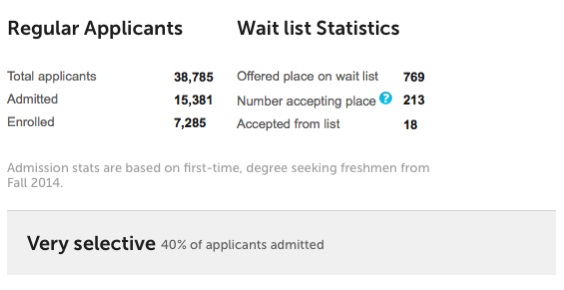Today’s guest post is from Ryan Hickey, Managing Editor of Petersons & EssayEdge.
 Your child is filling out forms, applying to schools, and getting ready to take the leap into the world of college life. As a parent, you may feel like your baby is slipping away, and as they begin acting more like an adult, your role becomes increasingly blurry. It’s not uncommon for parents to feel as confused, anxious, and overwhelmed as their college-bound kids.
Your child is filling out forms, applying to schools, and getting ready to take the leap into the world of college life. As a parent, you may feel like your baby is slipping away, and as they begin acting more like an adult, your role becomes increasingly blurry. It’s not uncommon for parents to feel as confused, anxious, and overwhelmed as their college-bound kids.
The truth is, the college search process requires a delicate balancing act between parents and their children. As parents prepare to let go of their kids, they must offer their support and guidance while encouraging independence. In other words, show them that you trust them enough to make their own decisions, but be prepared to speak up when they make questionable choices.
Ultimately, establishing a parent-child relationship built on mutual respect and trust is one of the most rewarding things you can ever do for your offspring. By following these tips, you can help your child get into college, adjust to the coming changes and keep your sanity, making you proud of what you’ve both accomplished.
Set aside plenty of time and energy to focus on the college search.
Taking the time to really decide on a college is not a simple or straightforward process — for you or your child. In fact, it can be unpredictable and haphazard. Don’t put things off until the last minute, when you might be distracted by work or they’re just trying to get through exams. Instead, get started early; ideally, you should begin looking for schools at least in your child’s junior year. If you organize right and work together, you can get it all done during their senior year, especially if you start early in the semester.
Use the resources available to you.
Colleges and universities know that this can be a trying time for both you and your child, and they have numerous resources available. Even before your child gets accepted into a school, ask as many questions as necessary to your contacts in the school. Knowing the answers to your questions gives you a leg up on the future, as well as helping alleviate some of your fears. Find out what kinds of resources are available before your child starts class, and use them early and often. It’s important to keep your child up-to-date on any communications you may have with contacts at schools — they should feel just as involved in the process as you do. When they have questions of their own, guide them to the resources they need to find answers.
Let your child make the final decision.
You may have your own ideas about where you want your child to go, but remember that choosing is an important part of growing into an adult. Make them part of the process, helping them to identify what draws them to one school versus another. This can help you bridge the gap between what you both want. Showing support for such an important decision can also help you, as the parent, show that you trust your child, something that can pay dividends down the road.
These tips can help you get started, but it’s up to you and your child to keep the momentum going. By making the process a unified approach between yourself and your child, you stand a better chance of making everything come together when your loved one steps out of your home and into their first college classroom.
_______________________
About the Author
Ryan Hickey is the Managing Editor of Peterson’s & EssayEdge and is an expert in many aspects of college, graduate, and professional admissions. A graduate of Yale University, Ryan has worked in various admissions capacities for nearly a decade, including writing test-prep material for the SAT, AP exams, and TOEFL, editing essays and personal statements, and consulting directly with applicants.











